
Geo UERJ
Scope & Guideline
Bridging Theory and Practice in Geographic Research
Introduction
Aims and Scopes
- Urban Geography and Planning:
The journal explores urban dynamics, including spatial transformations, real estate markets, and public space utilization, particularly in Brazilian cities. It investigates how urban planning intersects with socio-economic factors and environmental challenges. - Environmental Geography and Sustainability:
Research in this area focuses on the interactions between human activities and natural environments, emphasizing sustainability, land use changes, and the impacts of climate change on ecosystems and communities. - Social Geography and Vulnerability:
The journal addresses social inequalities and vulnerabilities, particularly in urban settings. It utilizes geographic data to analyze social issues such as housing, migration, and community resilience. - Historical Geography and Cultural Landscapes:
Papers often examine the historical development of geographic spaces and cultural landscapes, providing insights into how past events shape current socio-spatial dynamics. - Geographic Education and Methodology:
The journal also emphasizes the importance of geographic education, exploring pedagogical approaches, curriculum development, and innovative teaching methodologies in geography.
Trending and Emerging
- Climate Change and Urban Resilience:
There is an increasing focus on the impacts of climate change on urban areas, including studies on heat islands, flooding, and adaptive urban planning strategies, highlighting the importance of resilience in urban geography. - Social Vulnerability and Environmental Justice:
Recent papers emphasize the intersection of social vulnerability and environmental justice, exploring how marginalized communities are disproportionately affected by environmental issues and urban policies. - Technological Advances in Geographic Research:
The integration of geospatial technologies, remote sensing, and big data analytics is a growing trend, with studies utilizing these tools to enhance geographic research and analysis. - Public Health Geography:
Emerging themes in public health geography, particularly in the context of the COVID-19 pandemic, analyze spatial distributions of health resources, disease transmission, and the socio-spatial impacts of health crises. - Cultural Geography and Identity:
There is a rising interest in cultural geography, particularly regarding identity formation, migration, and the role of cultural landscapes in shaping social interactions and community resilience.
Declining or Waning
- Traditional Agricultural Studies:
Papers focusing solely on traditional agricultural practices and rural geography have become less prominent, possibly due to a shift towards urbanization and industrial agriculture topics. - Static Environmental Assessments:
Research centered on static environmental assessments without considering dynamic interactions and changes over time is declining, as there is a growing emphasis on adaptive management and resilience. - Historical and Colonial Geography:
While still relevant, papers focusing exclusively on colonial histories and their geographic implications have decreased, likely overshadowed by contemporary issues of social justice and environmental justice.
Similar Journals
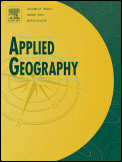
APPLIED GEOGRAPHY
Fostering collaborations for a thriving geospatial community.APPLIED GEOGRAPHY, published by Elsevier Science Ltd, stands as a premier journal within the fields of environmental science, geography, planning and development, as well as tourism, leisure, and hospitality management. With an impressive 2023 impact factor that reflects its high citation rates, this journal is ranked Q1 in several categories, underscoring its significance and influence in interdisciplinary research. Covering a broad range of topics from innovative environmental practices to spatial analysis and socio-economic factors affecting tourism, APPLIED GEOGRAPHY promotes insightful discussions and practical applications that are vital for advancing knowledge and practice in these fields. Researchers, professionals, and students will find the journal's rigorous peer-reviewed articles invaluable for staying informed about the latest trends and findings impacting the geospatial landscape. As an essential resource, APPLIED GEOGRAPHY aims to foster interdisciplinary collaborations and inspire scholarly dialogue, making it a cornerstone for those engaged in the study and application of geography across various sectors.

Hrvatski Geografski Glasnik-Croatian Geographical Bulletin
Unveiling Insights into Our Changing WorldHrvatski Geografski Glasnik-Croatian Geographical Bulletin, ISSN 1331-5854, E-ISSN 1848-6401, is an esteemed open-access journal published by the Croatian Geographical Society that has been serving the geography community since 1929. Based in Zagreb, Croatia, this journal focuses on a broad spectrum of geographical research, providing a platform for the dissemination of original articles, reviews, and case studies that contribute to the understanding of earth-surface processes and development planning. Although it currently holds Q4 rankings in both Earth-Surface Processes and Geography, Planning and Development, the journal is dedicated to enhancing its impact within the scientific community, aspiring to elevate research visibility and collaborative opportunities. With a commitment to open access, it ensures that all content is readily available to researchers, professionals, and students worldwide, fostering an inclusive environment for geographical scholarship. Engaging with this journal presents an opportunity to stay updated with emerging trends and pivotal studies within the discipline throughout its converged years from 1998 to 2024, making it a vital resource in geography and related fields.

Revista Geoaraguaia
Bridging Geography, Sociology, and Environmental StudiesRevista Geoaraguaia, published by UNIV FEDERAL MATO GROSSO, is an esteemed open-access journal dedicated to advancing research in the field of human and social sciences. Based in Brazil, this journal facilitates scholarly communication and fosters interdisciplinary approaches, exploring topics that encompass geography, sociology, and environmental studies. Although specific metrics like H-Index and impact factor are not listed, the journal is committed to providing a platform for innovative research that addresses pressing societal challenges. Researchers, academics, and students will find a rich repository of articles that not only contribute to theoretical frameworks but also enhance practical applications in various settings. By connecting local and global issues, Revista Geoaraguaia plays a crucial role in promoting academic discourse and advancing knowledge in the vibrant landscape of Latin American studies.
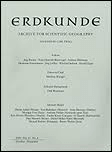
Erdkunde
Advancing Interdisciplinary Insights in GeographyErdkunde is a pivotal academic journal published by the Geographisches Institut, University of Bonn, dedicated to the fields of Geography, Earth and Planetary Sciences, and Ecology. With a history dating back to 1976, this journal serves as a platform for interdisciplinary research and discourse, reflecting diverse perspectives from both theoretical and applied dimensions within these domains. Published in Germany, it currently holds a respectable position within the academic community, classified in Q2 for Geography, Planning and Development and Q3 in Ecology and Earth and Planetary Sciences. Although not an open-access journal, its contribution is significant, offering insights that advance our understanding of spatial dynamics and environmental processes. With Scopus rankings that place it within the median range, Erdkunde is an essential resource for researchers, professionals, and students looking to deepen their knowledge and engage with contemporary trends in geographic research.
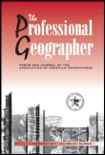
PROFESSIONAL GEOGRAPHER
Navigating the Landscape of Geographical KnowledgePROFESSIONAL GEOGRAPHER is a prominent journal in the fields of geography and earth-surface processes, published by Routledge Journals, Taylor & Francis Ltd. With a rich history dating back to 1949 and continuing through 2024, it serves as a vital platform for researchers, professionals, and students to explore and disseminate groundbreaking research and insights within the geographical sciences. The journal holds a respectable impact factor, placing it in the Q2 quartile for both Earth-Surface Processes and Geography, Planning and Development as of 2023, highlighting its importance in these critical academic areas. The journal ranks #273 out of 821 in Geography and Planning and #70 out of 179 in Earth and Planetary Sciences on Scopus, reflecting its robust contribution to advancing knowledge in social sciences. Although it does not currently offer open access options, it still provides invaluable content that influences pedagogy and research in geography. Its comprehensive scope invites a wide range of geospatial topics, encouraging interdisciplinary dialogue and collaboration across the global academic community.

Revista Formacao Online
Exploring the Future of Teaching in Digital SpacesRevista Formacao Online is a distinguished academic journal dedicated to the field of online education and teacher training. Published by UNIV ESTADUAL PAULISTA JULIO MESQUITA FILHO, this journal has been a vital contributor to educational research since its inception in 1994. It aims to promote scholarly discourse on innovations, methodologies, and best practices in online learning environments, making it an invaluable resource for educators, researchers, and practitioners alike. With its Open Access model, the journal ensures that its contents are readily available to a global audience, facilitating the dissemination of knowledge and encouraging collaboration across the academic community. The journal's commitment to excellence is reflected in its rigorous peer-review process, which upholds high academic standards and enhances its credibility within the education sector. By focusing on current trends, challenges, and advancements in online education, Revista Formacao Online plays a pivotal role in shaping the future of educational practices and research.

GEOGRAFICKY CASOPIS-Geographical Journal
Connecting scholars to the forefront of geographical knowledge.GEOGRAFICKY CASOPIS-Geographical Journal is a prestigious publication dedicated to advancing knowledge in the fields of geography and earth sciences, published by the SLOVAK ACADEMY OF SCIENCES, INSTITUTE OF GEOGRAPHY. With a rich history dating back to its inception in 1976, the journal serves as a vital forum for researchers and professionals to disseminate their findings across a range of topics including earth-surface processes, geography, planning, development, and geology. Notably, it maintains a respectable Q3 category ranking across these disciplines as of 2023, indicating its contribution to relevant academic discourse. The journal is indexed under critical databases and engages a global audience, making it an essential resource for scholars seeking to stay informed about contemporary issues and advancements in geography. Although currently not an open-access journal, it emphasizes the sharing of significant research findings and encourages submissions from various geographical contexts to enrich the scientific community. Geographical Journal's commitment to fostering interdisciplinary dialogue ensures its relevance and importance in shaping the future of geographical research.

Revista Geografica de America Central
Unveiling the Dynamics of Central American Landscapes.Revista Geografica de America Central is a distinguished scholarly journal published by the UNIV NACL, ESCUELA CIENCIAS GEOGRAFICAS, focusing on the dynamic field of geography, particularly within Central America. Since its inception in 1974, the journal has championed the dissemination of open-access research, fostering collaboration and innovation among researchers, professionals, and students alike. With an evolving scope that reflects the region's rich geographical diversity, this journal serves as a vital platform for sharing empirical studies, theoretical advancements, and methodological discussions that enhance our understanding of Central America's unique environmental and socio-economic challenges. Although it has experienced various coverage periods, the journal remains committed to advancing geographic scholarship and supporting open academic discourse. Its open-access model ensures that essential knowledge is readily available to an expanding global audience, making it an invaluable resource in the field.
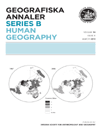
GEOGRAFISKA ANNALER SERIES B-HUMAN GEOGRAPHY
Transforming perspectives on geography and human behavior.GEOGRAFISKA ANNALER SERIES B-HUMAN GEOGRAPHY, published by Taylor & Francis Ltd, is a leading academic journal dedicated to advancing the field of human geography. With an ISSN of 0435-3684 and an E-ISSN of 1468-0467, this journal has established its reputation since its inception in 1976. It currently holds a prestigious Q1 ranking in Geography, Planning, and Development, reflecting its significant impact in the academic community with a Scopus rank of #243 out of 821 in its category, showcasing a 70th percentile standing among its peers. The journal aims to publish high-quality, innovative research that enhances our understanding of the complex interactions between humans and their environments. Although it operates on a subscription basis, the rigor of its peer-review process and the quality of published articles make it an essential resource for researchers, professionals, and students alike. By exploring pivotal themes in human geography, the journal not only contributes to academic discourse but also informs policy-making and practical applications in the field.
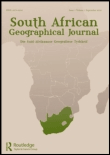
South African Geographical Journal
Connecting research and practice in geography and planning.The South African Geographical Journal, published by Routledge Journals, Taylor & Francis Ltd, is a leading scholarly platform dedicated to advancing research in the fields of geography, planning, and development. With an impressive history spanning from 1931 to 2024, this journal not only retains its relevance in the academic community but also proudly holds a Q2 rank in both Earth and Planetary Sciences and Geography, Planning and Development, marking it as a significant contributor to the scholarly discourse. The journal is ranked in the top 32% of its category within Scopus, affirming its stature among researchers and professionals. Although it currently does not offer Open Access, the journal provides a critical forum for the exchange of ideas, methodologies, and findings, encouraging dialogue that informs policy and practice in the geographical sciences. Readers can expect a rich variety of articles that encompass both theoretical and practical aspects of geography, making it essential for academics and practitioners alike.